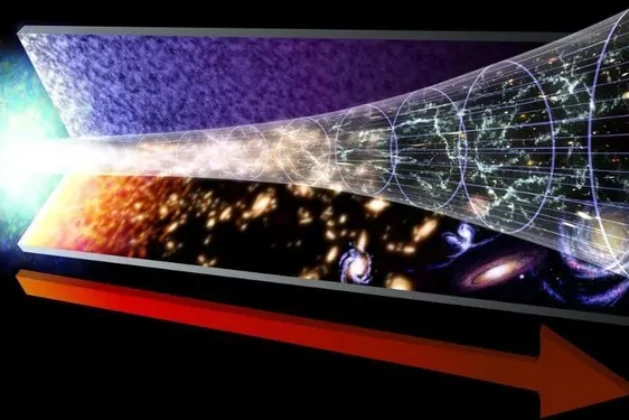Why do we remember yesterday and not tomorrow? Why does a glass shatter but never reassemble? The answer lies in a fundamental concept of physics: entropy. This invisible force governs not only the breakdown of matter but the very flow of time itself. In this article, we explore the science behind it and its deep connection with the forward march of time — a concept that affects everything from melting ice cubes to the destiny of the universe.
Table of Contents
Introduction: The Puzzle of Time’s Direction
Time is one of the most familiar aspects of our lives, yet also one of the most mysterious. We experience it as a steady flow from the past to the future. But from a purely physical standpoint, most laws of motion don’t care whether time moves forward or backward. So why, in our experience, does time only move one way?
The answer lies in entropy, a concept from the second law of thermodynamics. Understanding it offers a window into the very structure of our universe — from why your coffee cools down to how stars die. Let’s break it down.
What Is Entropy?
In simple terms, it is a measure of disorder or randomness. In any closed system, it tends to increase over time. This principle is known as the Second Law of Thermodynamics.
Imagine you drop a deck of cards. The ordered stack quickly turns into a messy pile. Reordering the deck requires effort — energy. This illustrates how natural processes tend to go from order to disorder.
Entropy isn’t just about messiness. It’s a fundamental law of nature that has a powerful influence on the way the universe evolves.
The Second Law of Thermodynamics
The second law states that in any energy transfer or transformation, some energy becomes unavailable for useful work, and the total entropy of an isolated system can never decrease.
In practical terms:
- Ice melts.
- Batteries drain.
- Heat flows from hot to cold.
- Systems degrade unless energy is constantly added to maintain order (like in living organisms).
This natural direction toward greater entropy is what gives time its arrow — a direction from past (low entropy) to future (high entropy).
Entropy and the Arrow of Time
Most fundamental laws of physics — such as Newton’s laws or Einstein’s theory of relativity — work the same forward or backward. But this introduces a clear direction.
Here’s how:
- A broken egg doesn’t spontaneously become whole.
- Smoke doesn’t gather back into a cigarette.
- You remember the past, not the future.
All of these are reflections of increasing entropy. The universe started in a highly ordered state (the Big Bang), and has been increasing in entropy ever since. This continual increase is what defines the forward flow of time.
Real-Life Examples
- Melting Ice
Ice absorbs heat from its surroundings and melts into water — a more disordered state. - A Campfire
Burning wood releases energy, turning solid fuel into gases and ash. The energy spreads out, increasing entropy. - Living Systems
Your body constantly fights this. You eat food (energy) to maintain order and structure. When energy isn’t replenished, systems decay — aging is one example. - Digital Data
Even data on hard drives degrades over time because of this. That’s why digital backups are essential.
Entropy and the Universe’s Fate
The implications of this extend beyond Earth — they affect the entire cosmos. If the universe continues expanding, and it keeps increasing, we may eventually reach a state called “heat death” — a time when all energy is evenly spread out, and no work or life is possible.
In this scenario:
- No stars will shine.
- No structures will form.
- Time, as we know it, would lose all meaning.
It’s a distant but sobering vision of how deeply this governs reality.
Is Reversing Time Possible?
From a purely theoretical standpoint, time could reverse if entropy decreased. But in our real, observable universe, it always increases in any isolated system.
Some thought experiments and science fiction stories explore time reversal, but so far, no known process allows for large-scale reversal of entropy — and therefore, time.
Conclusion: Entropy as the Timekeeper of the Universe
It is more than just a concept in physics — it’s a key to understanding why time moves forward, not backward. From melting ice cubes to the lifecycle of stars, it is at work in every part of our universe, shaping the direction of existence itself.
While we can’t stop it or reverse time, recognizing its role helps us appreciate the fragile balance of order in a naturally disordered universe — and reminds us of the preciousness of every moment.
Read More: Nebulae Unveiled: The Cosmic Birthplaces of Stars




